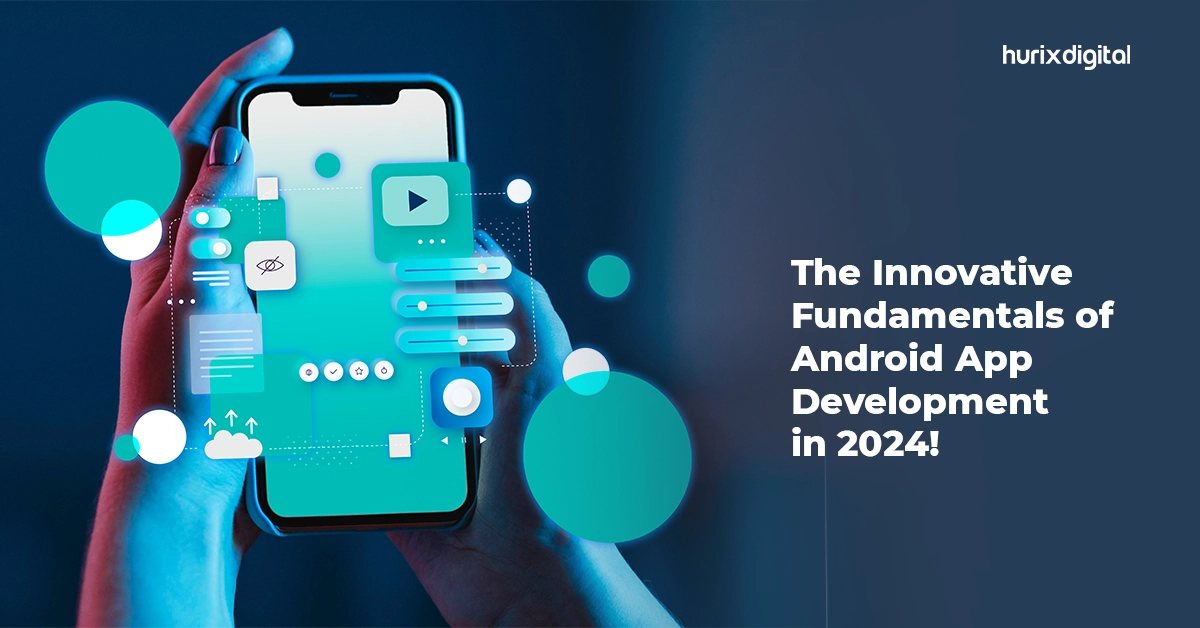The Innovative Fundamentals of Android App Development in 2024!
Android app development has undergone significant evolution over the years, marked by advancements in technology, changes in development tools, and shifts in user expectations.
This evolution happened to meet the growing demands of users and to teach new technologies, resulting in more sophisticated, feature-rich, and visually appealing applications. Developers continue to adapt to the changing landscape by adopting modern tools and practices to deliver high-quality apps to a diverse and expansive user base.
In this blog, we will understand how Android app development services have evolved over the years and look at some of the most ingenious fundamentals of Android app development in today’s day and scenario.
Table of Contents:
- Android App Development: A Brief
- Top Android App Development Fundamentals You Can’t Miss in 2024
- Wrapping Up
Android App Development: A Brief
Android app development is the process of creating software applications for devices running the Android operating system. Today, it has become one of the most widely used mobile platforms, powering a diverse range of devices, including smartphones, tablets, smart TVs, wearables, and more.
The journey of Android app development traces back to the early 2000s when Android Inc. was founded by Andy Rubin, Rich Miner, Nick Sears, and Chris White. In 2005, Google acquired Android Inc., signaling the beginning of Android’s integration into the tech giant’s ecosystem.
Here’s a quick look at the core Android app development tools and programming languages that are widely used to develop Android applications.
1. Android App Development Tools
- Android Studio: The official IDE for Android development provides a feature-rich environment for coding, debugging, and testing Android apps.
- Android SDK: The Android app development software development kit includes the necessary tools, libraries, and APIs for Android app development.
- Emulator: Android Emulator allows developers to test their apps on virtual devices with different configurations.
2. Programming Languages
- Java: Still a favorite among developers, Java has been utilized extensively for Android development.
- Kotlin: Developed as an official language, Kotlin has a clean syntax, improved security features, and Java compatibility.
Top Android App Development Fundamentals You Can’t Miss in 2024
Here is an in-depth review of our top 12 highly innovative fundamentals of Android mobile app development that just can not be missed in 2024:
Android Jetpack Compose:
For creating native Android apps, Jetpack Compose is a cutting-edge UI toolkit. It uses a declarative approach to UI development, making it easier for developers to describe how the UI should look and behave.
This toolkit simplifies UI development by reducing boilerplate code and providing a more intuitive way to create interactive and dynamic interfaces.
Kotlin Programming Language:
Kotlin is a statically typed programming language that is fully interoperable with Java, making it a preferred choice for Android development. It offers concise syntax, reducing the amount of code needed for common tasks.
Kotlin is designed to be null-safe, which helps in preventing null pointer exceptions, a common issue in Java. This enhances development speed and also reduces the likelihood of errors and the creation of robust applications.
Artificial Intelligence (AI) and Machine Learning (ML):
The rise of AI has resulted in Android apps increasingly incorporating AI and ML to offer features such as personalized recommendations, image recognition, and natural language processing.
TensorFlow and other ML frameworks have Android support, allowing developers to integrate machine learning models into their applications. As a result, apps now offer features such as predictive text, voice recognition, and recommendation systems, enhancing user engagement and satisfaction.
Android Instant Apps:
Instant Apps allow users to experience an app without installing it. This is achieved through modularization, where specific features of the app can be accessed via deep links without requiring the user to download and install the entire app.
MotionLayout:
MotionLayout is a part of the ConstraintLayout library and simplifies the creation of complex animations and transitions. Developers can define motion scenes to describe how UI elements move and transform between different states, providing smoother and more interactive user experiences.
Support for Foldable and Dual-Screen smartphones:
As foldable and dual-screen Android smartphones become more common, developers are customizing their apps to take full use of these novel form factors.
Developers can create innovative and adaptable designs that seamlessly transition between different screen configurations, providing users with a more versatile and immersive experience.
Android App Bundles:
App Bundles are a publishing format that includes all the resources and code necessary to deliver a personalized APK for each user’s device configuration. This helps reduce the size of app downloads and ensures that users receive optimized versions based on their device specifications.
Biometric Authentication:
Android supports biometric authentication methods like fingerprint scanning and facial recognition for user authentication. Developers can integrate these features to enhance the security of their apps while providing a convenient and user-friendly authentication experience.
Android 14 Features:
In Android 14, the newly introduced Credential Manager offers versatile support for multiple sign-in methods, including username and password combinations, secure passkeys, and seamless federated sign-in solutions like “Sign-in with Google” – accessible through a single API.
Moreover, Android 14 enhances its features in alignment with the OpenJDK 17 LTS release. This includes updates to various libraries and comprehensive support for Java 17 language which provide developers with tools and capabilities for efficient and forward-looking Android app development.
Improved Security Measures:
Android continually enhances security features to protect user data and privacy. Developers focus on implementing features such as app sandboxing, secure communication protocols, and encryption to ensure the integrity and confidentiality of user information.
Furthermore, continuous improvements in security measures, such as runtime permissions, scoped storage, and privacy-focused features in recent Android versions, have strengthened the overall security posture of Android apps.
5G Technology Integration:
With the rollout of 5G networks, developers are exploring ways to leverage faster data speeds for improved app performance. This includes optimizing content delivery, streaming high-quality media, and exploring new possibilities for real-time communication and data-intensive applications.
Location-Based Services:
Apps use location data for various purposes, including personalized content delivery, location-aware notifications, and geotagging. Developers can integrate location-based services to enhance user engagement by delivering context-aware and relevant information based on the user’s location.
Also Read: How IoT Will Impact Your Mobile App Development
Wrapping Up
The advancements in mobile app development technologies have brought about a revolution that shaped a landscape where developers can create powerful, visually stunning, and highly personalized applications.
These innovations continue to push the boundaries of what is possible, promising an exciting future for Android app development and the diverse array of applications that enrich the lives of users worldwide.
You can explore the future of digital education with Hurix Digital’s cutting-edge mobile app development solutions. With our help, you can boost your EdTech company’s impact in crafting engaging, scalable, and innovative mobile applications.
Contact us today to learn more!

SVP & Head – Hurix Technology Solutions
Global Delivery head with 25 years of working experience in NYC investment banks and fintech companies. Hands-on technology delivery management and program management, accountable for stakeholder relationships, Strategic roadmap, P&L, Revenue growth, Account Management, and employee satisfaction.









